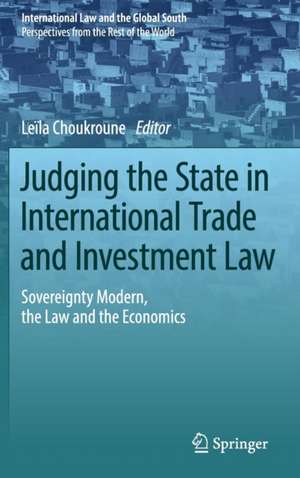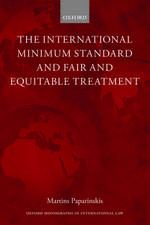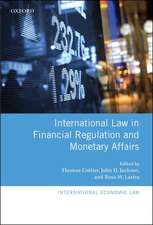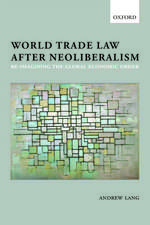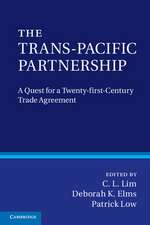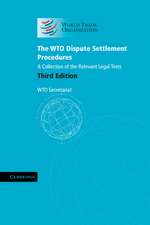Judging the State in International Trade and Investment Law: Sovereignty Modern, the Law and the Economics: International Law and the Global South
Editat de Leïla Choukrouneen Limba Engleză Hardback – 16 dec 2016
From a democratic deficit coupled with a deficit of legitimacy in relation to the questionable professionalism, independence and impartiality of adjudicators to the lack of consistency of decisions challenging essential public policies, trade and investment disputes have proven controversial. These challenges call for a rethinking of why, how and what for, are States judged.Based on a “sovereignty modern” approach, which takes into account the latest evolutions of a globalized trade and investment law struggling to put people’s expectations at its core, the book provides a comprehensive framework and truly original perspective linking the various facets of “judicial activity” to the specific yet encompassing character of international law and the rule of law in international society. In doing so, it covers a large variety of issues such as global judicial capacity building and judicial professionalism from an international and domestic comparative angle, trade liberalisation and States' legitimate rights and expectations to protect societal values, the legal challenges of being a State claimant, the uses and misuses of imported legal concepts and principles in multidisciplinary adjudications and, lastly, the need to reunify international law on a (human) rights based approach.
| Toate formatele și edițiile | Preț | Express |
|---|---|---|
| Paperback (1) | 724.17 lei 6-8 săpt. | |
| Springer Nature Singapore – 30 apr 2018 | 724.17 lei 6-8 săpt. | |
| Hardback (1) | 730.16 lei 6-8 săpt. | |
| Springer Nature Singapore – 16 dec 2016 | 730.16 lei 6-8 săpt. |
Preț: 730.16 lei
Preț vechi: 890.44 lei
-18% Nou
Puncte Express: 1095
Preț estimativ în valută:
139.74€ • 144.65$ • 118.11£
139.74€ • 144.65$ • 118.11£
Carte tipărită la comandă
Livrare economică 05-19 martie
Preluare comenzi: 021 569.72.76
Specificații
ISBN-13: 9789811023583
ISBN-10: 9811023581
Pagini: 219
Ilustrații: XIX, 222 p.
Dimensiuni: 155 x 235 x 14 mm
Greutate: 0.52 kg
Ediția:1st ed. 2016
Editura: Springer Nature Singapore
Colecția Springer
Seria International Law and the Global South
Locul publicării:Singapore, Singapore
ISBN-10: 9811023581
Pagini: 219
Ilustrații: XIX, 222 p.
Dimensiuni: 155 x 235 x 14 mm
Greutate: 0.52 kg
Ediția:1st ed. 2016
Editura: Springer Nature Singapore
Colecția Springer
Seria International Law and the Global South
Locul publicării:Singapore, Singapore
Cuprins
Chapter 1: Introduction: Judging the State in International Trade and Investment Law: Why, How and What for?.- PART I: International Trade: The WTO and Beyond.- Chapter 2. Judging the Judges or Judging the Members? Pathways and Pitfalls in the Appellate Body Appointment Process (by Arthur E. Appleton).- Chapter 3. WTO, State and Legal Capacity Building: An Indian Narrative (by James J. Nedumpara).- Chapter 4. States’ Regulatory Autonomy to Protect Societal Values through Legitimate Regulatory Distinctions: Finding the balance in the WTO Agreement on Technical Barriers to Trade through Adjudication (by Denise Prévost).- PART II: Investment Litigation at a Crossroad.- Chapter 5. Investor-State Arbitration Distorted – When the Claimant is a State (by Julien Chaisse and Dini Sejko).- Chapter 6. Protecting States under Asian Multilateral Investment Treaties Claims, Counterclaims and Interim Relief Measures (by Rahul Donde and Trisha Mitra).- Chapter 7. Determination of Indirect Expropriation and Doctrine of Police Power in International Investment Law: A Critical Appraisal (Prabhash Ranjan and Pushkar Anand).- PART III: International Law’s Local Experiments and Global Challenges.- Chapter 8. Role of Indian Judiciary in the Realm of International Trade and Investment Law (Amal K. Ganguli).- Chapter 9. Human Rights in International Investment Disputes - Global Litigation as International Law Re-unifier (Leïla Choukroune).- Chapter 10. Conclusion: Sovereignty Modern.
Recenzii
“This small volume contains a collection of contributions of academics and practitioners … . As is often the case with collective works, the different contributions to this volume do not necessarily follow an identical approach and some of them may be more relevant to the central topic than others. … the book constitutes useful reading for international economic law academics and practitioners alike.” (Panayotis M. Protopsaltis, Leiden Journal of International Law, Vol. 32 (2), 2019)
Notă biografică
Prof. Leïla Choukroune is Director of the Centre for Social Sciences and Humanities (CSH), New Delhi India, the French National Research Centre (CNRS) Unit on South Asia. Before taking the responsibility of the CSH directorship, she was Associate Professor with the Law Faculty of Maastricht University, The Netherlands, Assistant Professor with HEC Paris, France, Consultant with the OECD, Lecturer with Paris I Panthéon-Sorbonne, France, and Researcher with the French Centre for Research on Contemporary China (CEFC), Hong Kong. She was Deputy Director of the Institute for Globalization and International Regulation (IGIR) and Director of the Advanced Master in International Economic Law at the Maastricht University.
She holds a Doctorate in international law (Summa cum laude – highest honor) from the University Paris I Panthéon Sorbonne and is a qualified lawyer to the Paris Bar.
Her research focuses on the interactions between trade, investment and human rights and is applied to emerging countries, China and India in particular. She has published numerous scientific articles and authored several books including (with Sangeeta Khorana) Global Health and the Emerging World: An Integrated International Trade Approach, (Springer, forthcoming 2017). She is the Editor of the Springer book series International Law and the Global South, and member of the Editorial Board of China Perspectives.
Leïla Choukroune is regularly solicited as an independent expert on international economic law and business and human rights issues. She is an independent adviser to the International Federation for Human Rights (FIDH) and a Member of the French National Books Commission (CNL).
She holds a Doctorate in international law (Summa cum laude – highest honor) from the University Paris I Panthéon Sorbonne and is a qualified lawyer to the Paris Bar.
Her research focuses on the interactions between trade, investment and human rights and is applied to emerging countries, China and India in particular. She has published numerous scientific articles and authored several books including (with Sangeeta Khorana) Global Health and the Emerging World: An Integrated International Trade Approach, (Springer, forthcoming 2017). She is the Editor of the Springer book series International Law and the Global South, and member of the Editorial Board of China Perspectives.
Leïla Choukroune is regularly solicited as an independent expert on international economic law and business and human rights issues. She is an independent adviser to the International Federation for Human Rights (FIDH) and a Member of the French National Books Commission (CNL).
Textul de pe ultima copertă
This book addresses concerns with the international trade and investment dispute settlement systems from a statist perspective, at a time when multilateralism is deeply questioned by the forces of mega-regionalism and political and economic contestation. In covering recent case law and theoretical discussions, the book’s contributors analyze the particularities of statehood and the limitations of the dispute settlement systems to judge sovereign actors as autonomous regulators.
From a democratic deficit coupled with a deficit of legitimacy in relation to the questionable professionalism, independence and impartiality of adjudicators to the lack of consistency of decisions challenging essential public policies, trade and investment disputes have proven controversial. These challenges call for a rethinking of why, how and what for, are States judged.Based on a “sovereignty modern” approach, which takes into account the latest evolutions of a globalized trade and investment law struggling to put people’s expectations at its core, the book provides a comprehensive framework and truly original perspective linking the various facets of “judicial activity” to the specific yet encompassing character of international law and the rule of law in international society. In doing so, it covers a large variety of issues such as global judicial capacity building and judicial professionalism from an international and domestic comparative angle, trade liberalisation and States' legitimate rights and expectations to protect societal values, the legal challenges of being a State claimant, the uses and misuses of imported legal concepts and principles in multidisciplinary adjudications and, lastly, the need to reunify international law on a (human) rights based approach.
From a democratic deficit coupled with a deficit of legitimacy in relation to the questionable professionalism, independence and impartiality of adjudicators to the lack of consistency of decisions challenging essential public policies, trade and investment disputes have proven controversial. These challenges call for a rethinking of why, how and what for, are States judged.Based on a “sovereignty modern” approach, which takes into account the latest evolutions of a globalized trade and investment law struggling to put people’s expectations at its core, the book provides a comprehensive framework and truly original perspective linking the various facets of “judicial activity” to the specific yet encompassing character of international law and the rule of law in international society. In doing so, it covers a large variety of issues such as global judicial capacity building and judicial professionalism from an international and domestic comparative angle, trade liberalisation and States' legitimate rights and expectations to protect societal values, the legal challenges of being a State claimant, the uses and misuses of imported legal concepts and principles in multidisciplinary adjudications and, lastly, the need to reunify international law on a (human) rights based approach.
Caracteristici
Provides readers with the latest developments on why, how and what for States are sued for breaches of their international trade and investment obligations Covers recent case law and theoretical discussions in a logical, clear and concise manner Analyzes the specificities of statehood and the limitations of the dispute settlement systems to judge sovereign actors as autonomous regulators Includes supplementary material: sn.pub/extras
